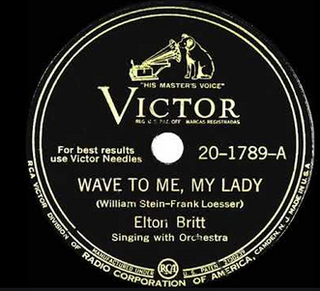"Goodnite, Sweetheart, Goodnite" is a popular song that was a hit during the mid-1950s. It was written by Calvin Carter and James "Pookie" Hudson in 1951, and was first recorded by The Spaniels in 1953. It has also been released by some artists as "Goodnight, Well It's Time to Go".
"Oklahoma Hills" is a song written by Woody Guthrie. In 2001 it was named the official Folk Song of the state of Oklahoma.
This is a list of notable events in country music that took place in the year 1945.
"At Mail Call Today" is a song written by American country music artist Gene Autry and Fred Rose. The two had a successful song writing partnership dating back to 1941, including "Be Honest With Me", "Tweedle-O-Twill" and "Tears On My Pillow". Rose, with Roy Acuff, founded Acuff-Rose Music Publishing in 1942, and in 1947, would go on to producing Hank Williams. Autry, after a brief lull in film making due to WWII, would be back to his pre-war output by 1946.
"Sioux City Sue" is a 1945 song and a 1946 movie. Lyricist Ray Freedman and composer Dick Thomas wrote the song. Thomas recorded the song in February 1945 for National Records and it was a number one Country charts hit for him. The song was Thomas' first chart entry on the Juke Box Folk Records chart and was also his most successful release: "Sioux City Sue" spent four weeks at number one on the Country charts during a stay of twenty-three weeks. The Dick Thomas version also reached Billboard's Best-selling Record charts attaining the No. 16 position.

"So Sad " is a song written by Don Everly, which was released by The Everly Brothers in 1960. The song was later a country hit for multiple artists in the 1970s and 80s.
"(Remember Me) I'm The One Who Loves You" is a song written and originally sung by Stuart Hamblen, which he released in 1950. The song was a hit for Ernest Tubb the same year, and Dean Martin in 1965. Johnny Cash also covered it on his 1957 debut album Johnny Cash with His Hot and Blue Guitar!
"Honey, Do You Think I'm Wrong" is a country music song written by Al Dexter and Frankie Marvin, performed by Al Dexter and His Troopers, and released on the Columbia label. In February 1946, it reached No. 2 on the folk chart. It spent eight weeks on the charts and was ranked as the No. 12 record in Billboard's year-end folk juke box chart. It was the "B-side" to "Guitar Polka" which peaked at No. 1.

"Drivin' Nails in My Coffin" is a country music song written by Jerry Irby. It is a breakup song, telling of a man who has been drinking booze, "driving nails in my coffin over you."

"Wave to Me, My Lady" is a country music song written by William Stein and Frank Loesser, sung by Elton Britt, and released on the RCA Victor label. In March 1946, it reached No. 3 on the Billboard folk chart. It was also ranked as the No. 22 record in Billboard's 1946 year-end folk juke box chart.

"Silver Spurs " is a country music song written by Cindy Walker and Gene Autry, sung by Autry, and released in 1946 on the Columbia label. In February 1946, it reached No. 4 on the Billboard most-played folk chart. It was also ranked as the No. 27 record on the Billboard 1946 year-end folk record sellers chart.
The Billboard Most-Played Folk Records of 1946 is a year-end chart compiled Billboard magazine ranking the year's top folk records based on the number of times the record was played on the nation's juke boxes. In 1946, country music records were included on, and dominated, the Billboard folk records chart.

"Freight Train Boogie" is a country music song written by Alton and Rabon Delmore under the pseudonyms, Jim Scott and Bob Nobar. The song was recorded by The Delmore Brothers in Cincinnati. It was released in 1946 on the King label. In December 1946, it reached No. 2 on the Billboard folk chart. It was also ranked as the No. 30 record on the Billboard 1946 year-end folk juke box chart. Often the recording is regarded as one of the first Rock and Roll recordings.

"That's How Much I Love You" is a country music song written by Arnold, Fowler, and Hall, sung by Eddy Arnold, and released in 1946 on the RCA Victor label. In October 1946, it reached No. 2 on the Billboard folk chart. It was also ranked as the No. 10 record on the Billboard 1946 year-end folk juke box chart.






